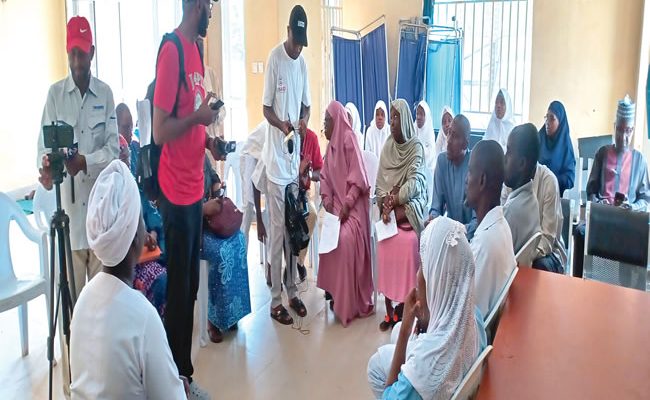
In Bauchi State, the burden of maternal and child deaths is quite huge as can be seen in all relevant surveys and studies carried out in the National Demographic Health Survey (NDHS) 2018 and Maternal, Perinatal and Child Deaths Surveillance Response (MICS) 2021. This development is a cause for concern, considering the importance of family health as well as the initiatives of achieving Universal Health Coverage (UHC).
According to the current Multiple Indicator Cluster Survey (MICS) of 2021, delivery assisted by any skilled attendant in Bauchi State is only 17.4 percent, while antenatal care (at least four visits during pregnancy) by any provider is 43.3 percent and antenatal care (at least one visit by skilled provider is 42.5 percent).

The MICS 2021 also indicated that post-natal healthcare checks for mothers is 40.4 percent just as the survey also revealed that women aged 15 to 49 years (child bearing age) who received appropriate care in health facilities across Bauchi State are less than the North-East sub region and national rates. The survey further indicated that early childhood death rates are higher in Bauchi State compared to the rates for the North-East and the entire country.
As contained in the MICS 2021, under-five mortality per 1,000 live births is 153 which is above the national average of 102 and the entire North-East that stands at 114. Child mortality rate in Bauchi State stands at 70 per 1,000 live birth while infant mortality rate is 89 per 1,000 live births. Post neonatal and neonatal mortality rates in Bauchi State are 43 and 45 per 1,000 live births, according to MICS 2021.
Most of these deaths, according to health experts, are not reported as pregnancy or birth related deaths at the community or, even health facility levels.
Maternal, Perinatal and Child Death Surveillance Response (MPCDSR) is a World Health Organisation’s (WHO) initiative designed to account for every maternal, perinatal and child deaths wherever it occurs, be it at health facility or home. It is aimed at improving the family health initiatives.
MPCDSR initiative aims to bring out information on identification, notification and determining the causes of all maternal, perinatal and child deaths. Information collected from this enquiry is being used to respond with appropriate actions, through informed decisions, with a view to preventing future occurrences of such deaths.
With several other programmes and innovative approaches being devised to improve maternal, newborn and child health (MNCH) across all levels of healthcare services, the MPCDSR is yet another measure that emphasises on Quality of Care (QoC) and Quality Improvement (QI) in healthcare services.
Though the state government has done well in ensuring that there are facilities in all the 323 political wards in the state just as there are secondary facilities in each of the 20 LGAs as well as partnering with two tertiary facilities, availability of human resources has remained the major factor militating against the objectives of the Universal Health Coverage (UHC).
The above leads to rising issues of maternal, perinatal child death which MPCDSR is aimed at checking but needs the combine efforts of all relevant stakeholders in the sector.
However, in order to ensure that there is better understanding of the concept and operation of the MPCDSR, the media has a significant role to play, most importantly, in reversing the trend that is negatively impacting on family health in the state.
Worried by the no-too-good condition of healthcare services delivery, health reporters in Bauchi State, under the aegis of a civil society organisation (CSO), known as Journalists for Public Health and Development Initiative (J4PD), had over the past few years, played significant role in advocating a concerted efforts from the government and non-state actors for improved healthcare system in Bauchi State.
The CSO came about after series of trainings, meetings, workshops and conferences organised by Development Communications (DevComs) on the issue of family and public health reportage for positive outcome in Bauchi State. The reporters resolved to work together to carve a niche in that area of reporting.
However, the capacity of the members of J4PD was built by United States Agency for International Development (USAID) funded Integrated Health Programme (IHP) through various capacity building trainings, workshops and conferences in the past four years. The capacity building trainings have improved the journalistic skills of the J4PD members.
Recently, USAID IHP decided to support Bauchi State in resuscitating the activities of the MPCDSR Steering Committee, and saw the need to mainstream J4PD members into one of the subcommittee of the newly reinvigorated MPCDSR Committee. The first thing USAID IHP did was to organise an intensive capacity building training for members of J4PD to acquaint them with the concept of MPCDSR.
The objective of the training was to deepen knowledge of journalists on the gravity of maternal, newborn and child deaths as well as exposing them to the use of MPCDSR as an evidence-based approach towards preventing such deaths.
Other areas of focus during the training were discussions on the role and contribution of media towards reducing the burden of maternal, newborn and child deaths and, defining modalities of media reporting of such deaths.
At the training, the State Technical Director of USAID IHP, Dr Ibrahim Alhassan Kabo, said that journalists have the power to change nations through investigative and well-researched stories. He, however, pointed out that without research, right knowledge and information, the media has little or no impact to make in the society.
Dr Kabo urged the journalists to leverage on the knowledge gained at the MPCDRS training to embark on an in-depth investigation in order to have accurate report on the challenges, strengths, weaknesses and opportunities inherent in mitigating maternal, newborn and child deaths in Bauchi State.
The training involved a field visit to secondary and primary healthcare facilities where participants engaged service providers on how they conduct MPCDSR at their facilities.
During the field visit, question and concerns on the minds of the participants were how do facilities report maternal, perinatal and child deaths that occurs at the community level.
USAID IHP’s Human Resource Advisor, Dr Robinson Yusuf was on ground to answer questions from the participants that, though MPCDSR initiative is designed to report all MNC deaths at both the facility and community level, at the moment, the State MPCDSR Steering Committee is trying to institutionalise the initiative at facility level before moving into the community.
That for now, MPCDSR facility committee service providers have to rely on what the community reports through Ward Development Committees (WDCs) structures regarding such deaths, saying also that community sensitisation and awareness on MPCDSR is an area where the media can play an important role.
At the Misau General Hospital, it was stressed that for achieving the objectives of Maternal, Perinatal Child Death Surveillance Response (MPCDSR) in Bauchi State, men must effectively participate in all issues of family health. The men are particularly called to ensure that their wives attend health facilities close to them to access healthcare services from qualified medical personnel.
The officer in charge of the Maternity Department of the General Hospital, Misau, Eunice Oladeru, explained that the support of the fathers is required in ensuring that issues of health of the pregnant woman and her child were taken seriously.
According to her, “The support of the man will instil confidence in the woman as it will encourage her to visit the health facility, especially during the pregnancy period for antenatal care, to reduce the maternal mortality rate.”
Oladeru stressed that members of staff of the maternity were doing their best to provide quality healthcare service delivery to all the clients accessing the facility, assuring that they will continue to give their best.
Also speaking, a staffer of the maternity, Fatima Mohammed Bashir, expressed dismay at the attitude of men who don’t support their wives, particularly those who are pregnant from attending health facilities for care.
She said this has remained the major issue militating against quality healthcare service delivery for women as many of the men prefer to have their wives deliver at home.
Fatimah Bashir, a registered nurse and registered midwife, said that “Some pregnant women are brought to the facility at the last hour, after their condition must have become complicated. In such situations, there is little or nothing we can do as health workers.”
She also said that the introduction of MPCDSR has really assisted in reducing issues of maternal mortality and infant mortality rates in Misau council because, according to her, “The MPCDSR committee do review some of the cases periodically.”
She added that MPCDSR has improved access to quality healthcare service delivery in terms of safe deliveries and care for the child immediately after delivery.
READ ALSO FROM NIGERIAN TRIBUNE







